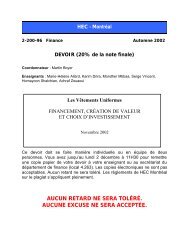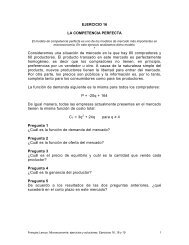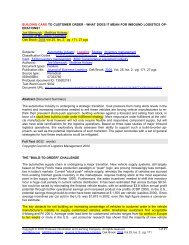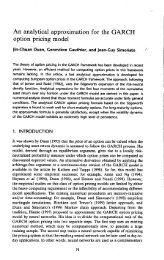- Page 1 and 2:
Volume 2 Contents: A Global Examina
- Page 3 and 4: A Global Examination Of Relationshi
- Page 5 and 6: and to measure them simultaneously
- Page 7 and 8: customers’ total consumption expe
- Page 9 and 10: From product perceived quality towa
- Page 11 and 12: cumulative, or a combination of the
- Page 13 and 14: trust4 -.68 commit1 .59 commit2 .51
- Page 15 and 16: we observed that the least correlat
- Page 17 and 18: outside of the consumption experien
- Page 19 and 20: REFERENCES Anderson Eugene W., Forn
- Page 21 and 22: Holbrook Morris B. Consumer Value:
- Page 23 and 24: APPENDIX 1. DESCRIPTION OF THE ITEM
- Page 25 and 26: An Empirical Examination of Retail
- Page 27 and 28: This paper is organized in the foll
- Page 29 and 30: Human and cognitive effort has been
- Page 31 and 32: Seiders, Berry, and Gresham (2000)
- Page 33 and 34: The four dimensions of retail conve
- Page 35 and 36: 2000). In-store shoppers receive th
- Page 37 and 38: process resulted in slightly differ
- Page 39 and 40: examine the dimensionality of these
- Page 41 and 42: Seiders, Berry, and Gresham’s (20
- Page 43 and 44: used, and the respondents were all
- Page 45 and 46: Enis BM, Roering KJ. Product classi
- Page 47 and 48: Table 1 Dimensions of Convenience G
- Page 49 and 50: Table 3 Retail Convenience Scale Re
- Page 51 and 52: Table 5 Correlations, Means, and St
- Page 53: Error! Figure 1 Retail Convenience
- Page 57 and 58: shopping environment. How do males
- Page 59 and 60: optimization. More recently, Arnold
- Page 61 and 62: H1 : H2 : The relationship between
- Page 63 and 64: Each subject experience both experi
- Page 65 and 66: In the “shopping as work” condi
- Page 67 and 68: This pattern is consistent with our
- Page 69 and 70: Figure 3 - Shopping orientation and
- Page 71 and 72: Should an online shopping web site
- Page 73 and 74: Belk Russell W. Situational variabl
- Page 75 and 76: Hoffman Donna L. Novak Thomas P. Ma
- Page 77 and 78: Russell James A. Affective space is
- Page 79 and 80: The Influence of Intangibility on P
- Page 81 and 82: educes risk and evaluation difficul
- Page 83 and 84: surroundings and presentations (Ber
- Page 85 and 86: services than for goods, financial
- Page 87 and 88: his propositions, his arguments on
- Page 89 and 90: was more than one type of involveme
- Page 91 and 92: 3.3. Pretests and Data Collection W
- Page 93 and 94: it comes to generality and physical
- Page 95 and 96: these findings rests on the positiv
- Page 97 and 98: commitment (Howard and Sheth 1969).
- Page 99 and 100: perceived physical intangibility, m
- Page 101 and 102: Consumer Research, vol. 17. Provo,
- Page 103 and 104: Roselius TR. Consumer rankings of r
- Page 105 and 106:
Online Offline Total 196 195 391 19
- Page 107 and 108:
INV29: I perceive a ____ is: Means
- Page 109 and 110:
Hypotheses Results H1: The degree o
- Page 111 and 112:
(Constant) Knowledge Knowledge and
- Page 113 and 114:
Physical intangibility Mental intan
- Page 115 and 116:
Table 12 Stepwise multiple regressi
- Page 117 and 118:
Exploring the WOW in Online Auction
- Page 119 and 120:
such as the individual-auction feed
- Page 121 and 122:
LITERATURE REVIEW Word-of-Web Word-
- Page 123 and 124:
Online auction feedback, or reputat
- Page 125 and 126:
1 Note that eBay actually indicated
- Page 127 and 128:
The sources which provided the rati
- Page 129 and 130:
In study one, we learned more about
- Page 131 and 132:
However, there is more to understan
- Page 133 and 134:
Consumers, again, were quick to foc
- Page 135 and 136:
an easy way to see only negative co
- Page 137 and 138:
order/time in which feedback was re
- Page 139 and 140:
Kahneman, Daniel and Amos Tversky.
- Page 141 and 142:
Tversky, Amos and Daniel Kahneman.
- Page 143 and 144:
? Direction Direction is determined
- Page 145 and 146:
Physical Behaviour in Stores and Sp
- Page 147 and 148:
I.1. Theoretical Background To anal
- Page 149 and 150:
(1991) cultural exhibit Floch (1990
- Page 151 and 152:
Two key moments of a shopping trip
- Page 153 and 154:
table 3). « Going by » functional
- Page 155 and 156:
-Active ludic spaces aim at enterta
- Page 157 and 158:
Chart 3. Spatial configuration of t
- Page 159 and 160:
Chart 5a. Spatial configuration of
- Page 161 and 162:
Shopping enjoyment (Schmidt and Spr
- Page 163 and 164:
- In the passive ludic space, no pa
- Page 165 and 166:
we used triangulation with other wo
- Page 167 and 168:
Bibliography Aubert-Gamet V. and Co
- Page 169 and 170:
Semprini A. (1990), Métro, Réseau
- Page 171 and 172:
ASYMMETRIC QUALITY TIER COMPETITION
- Page 173 and 174:
Sivakumar and Raj (1997) showed tha
- Page 175 and 176:
(that is in the larger, between-tie
- Page 177 and 178:
changes in tradeoffs as is done in
- Page 179 and 180:
than the one based on the notion of
- Page 181 and 182:
The variables incorporated in the m
- Page 183 and 184:
Sivakumar and Raj (1997), inter-bra
- Page 185 and 186:
esults for a number of operationali
- Page 187 and 188:
Mela CF, Gupta S, Lehmann DR. Long
- Page 189 and 190:
Table 2. Empirical Illustration of
- Page 191 and 192:
Modeling The Impact Of Internet Atm
- Page 193 and 194:
model along with development of the
- Page 195 and 196:
ehavior and in duration time spent.
- Page 197 and 198:
sites have quite a simple structure
- Page 199 and 200:
and the updating of the information
- Page 201 and 202:
3.1.4. Entertainment According to D
- Page 203 and 204:
high score on every dimension to ga
- Page 205 and 206:
stage of liking (attitudes), and a
- Page 207 and 208:
short period of time because shoppe
- Page 209 and 210:
greater than 0.4. According to Nunn
- Page 211 and 212:
Finally, for the last hypothesis, H
- Page 213 and 214:
structure does not influence the le
- Page 215 and 216:
order to develop involvement toward
- Page 217 and 218:
Becker, L.B., Martino, R.A., and To
- Page 219 and 220:
Gore, P., Madhavan, S., McClung, G.
- Page 221 and 222:
Misic, M.M. and Johnson, K. Benchma
- Page 223 and 224:
Zaichkowsky, J.L. The Personal Invo
- Page 225 and 226:
INV Important to me (1)... Unimport
- Page 227 and 228:
Table 3: Statistical Significance o
- Page 229 and 230:
Figure 1: Initial Conceptual Model
- Page 231 and 232:
Mapping Retailing Enterpreneur Deci
- Page 233 and 234:
Applications of causal mapping are
- Page 235 and 236:
Propositions on Entrepreneurial Str
- Page 237 and 238:
entrepreneurs fail to recognize thi
- Page 239 and 240:
Finally, the three judges worked as
- Page 241 and 242:
individual summary maps of the Mill
- Page 243 and 244:
Growth. The growth stage of Millie
- Page 245 and 246:
upwardly mobile, professionals, mig
- Page 247 and 248:
Mintzberg, Henry, D. Raisinghani, a
- Page 249 and 250:
1 B.S. approaches Steinberg chain w
- Page 251 and 252:
An Empirical Examination of Retail
- Page 253 and 254:
dimensions of retail convenience an
- Page 255 and 256:
Like time, effort is also a valuabl
- Page 257 and 258:
Berry, Seiders, and Grewal (2002) i
- Page 259 and 260:
choose traditional stores over virt
- Page 261 and 262:
which consumers can reach a retaile
- Page 263 and 264:
shopping time as long as the desire
- Page 265 and 266:
analysis using LISREL 8.3 for Windo
- Page 267 and 268:
strong evidence of reliability and
- Page 269 and 270:
From a marketing standpoint, the re
- Page 271 and 272:
References Anderson Jr. WT. Conveni
- Page 273 and 274:
Kelley EJ. The importance of conven
- Page 275 and 276:
Dimension Items for In-Store Shoppe
- Page 277 and 278:
Dimensio n Table 4 Retail Convenien
- Page 279 and 280:
SD .89 .70 .80 .82 .91 .98 .91 .85
- Page 281 and 282:
What influences customer reaction t
- Page 283 and 284:
Management of in compatibility has
- Page 285 and 286:
A lot of commonalities can be found
- Page 287 and 288:
management of space (Martin and Par
- Page 289 and 290:
may not be adverse. Expected incomp
- Page 291 and 292:
consumer involvement varies with th
- Page 293 and 294:
their results were well below the a
- Page 295 and 296:
medicine purchase decisions. A five
- Page 297 and 298:
(F=297, p
- Page 299 and 300:
not eliminate it. Further, extreme
- Page 301 and 302:
Averill, J. R. (1973), “Personal
- Page 303 and 304:
Table…1 Estimated Marginal Means
- Page 305 and 306:
Run Control Over Activities Figure
- Page 307:
307














